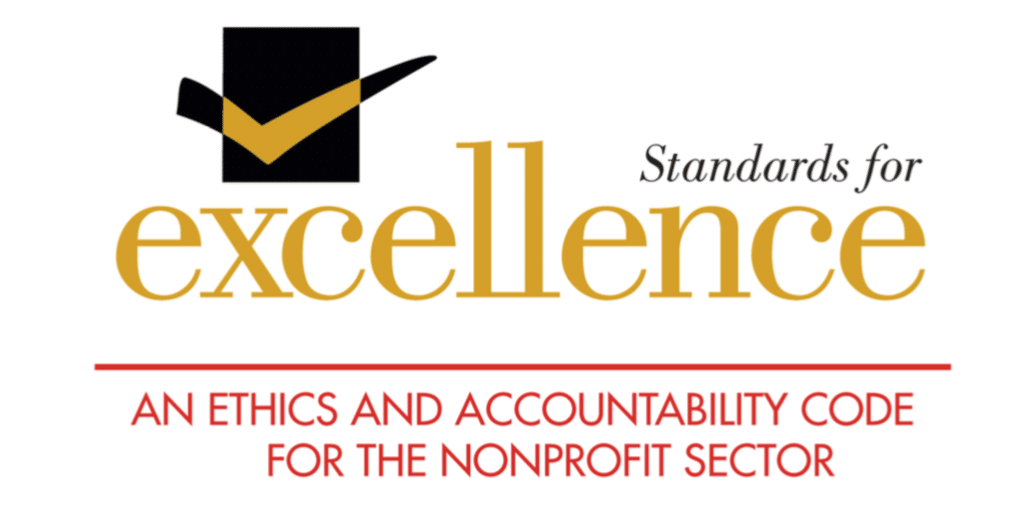PREAMBLE
America’s nonprofit sector serves the public interest and plays an essential role in our society and economy. Hard at work strengthening communities across the nation, nonprofits enrich our lives in a variety of ways by creating a broad array of benefits to society in fields such as charitable, religious, scientific, economic, health, cultural, civil rights, environment, and education.
Public investment and confidence drive the success of nonprofit organizations. Individuals, corporations, foundations, and federal, state, and local governments add value to the services that nonprofits provide by investing time, resources, and funds.
The Standards for Excellence Institute aims to raise the level of accountability, transparency, and effectiveness of all nonprofit organizations to foster excellence and inspire trust. The Standards for Excellence code (Standards or code) provides a framework and step-by-step guidelines to achieve a well-managed and responsibly-governed organization.
The code builds upon the legal foundations of nonprofit management, governance, and operations to embrace fundamental values such as honesty, integrity, fairness, respect, trust, compassion, responsibility, and transparency. The code consists of six Guiding Principles in 27 topic areas with specific performance benchmarks that characterize effective, ethical, and accountable organizations. The Institute helps the nonprofit sector operate in accordance with the Standards for Excellence code by providing educational resources, assistance, and a voluntary accreditation process.
The Standards for Excellence Institute encourages all nonprofit organizations to adopt the Guiding Principles of the Standards for Excellence code. By implementing the performance benchmarks in the code, nonprofit organizations will meet the highest ethical standards for effective service in the public interest.
STANDARDS FOR EXCELLENCE – GUIDING PRINCIPLES
I. MISSION, STRATEGY and EVALUATION
Guiding Principle: Nonprofits are founded for the public good and operate to accomplish a stated purpose through specific program activities. A nonprofit should have a well-defined mission, and its programs should effectively and efficiently work toward achieving that mission. Nonprofits have an obligation to ensure program effectiveness and to devote the resources of the organization to achieving its stated purpose.
[Resource Packets]
II. LEADERSHIP: BOARD, STAFF, and VOLUNTEERS
Guiding Principle: Nonprofits depend upon effective leadership to successfully enact their missions and programs. Effective leadership consists of a partnership between the board and management, each of which plays an essential role. Understanding and negotiating these shared and complex elements of leadership is essential to the organization’s success. A nonprofit’s employees and volunteers are fundamental to its ability to achieve its mission.
Board members are in a position of trust to ensure that resources are used to carry out the mission of the organization. An organization’s board leadership should consist of volunteers who are committed to the mission and who demonstrate an understanding of the community served. An effective nonprofit board should determine the mission of the organization, establish management policies and procedures, assure that adequate human and financial resources are available, and actively monitor the organization’s allocation of resources to effectively and efficiently fulfill its mission.
Nonprofits should also have executive leadership which carries out the day-to-day operations of the organization, ensures financial and organizational sustainability, and provides adequate information to the board of directors. An organization’s human resource policies should address both paid employees and volunteers and should be fair, establish clear expectations, and provide meaningful and effective performance evaluation.
[Resource Packets]
III. LEGAL COMPLIANCE and ETHICS
Guiding Principle: Nonprofits enjoy the public’s trust, and, therefore, must comply with a diverse array of legal and regulatory requirements. Organizations should conduct periodic reviews to address regulatory and fiduciary concerns. One of a leadership’s fundamental responsibilities is to ensure that the organization governs and operates in an ethical and legal manner. Fostering exemplary conduct is one of the most effective means of developing internal and external trust as well as preventing misconduct. Moreover, to honor the trust that the public has given them, nonprofits have an obligation to go beyond legal requirements and embrace the highest ethical practices. Nonprofit board, staff, and volunteers must act in the best interest of the organization, rather than in furtherance of personal interests or the interests of third parties. A nonprofit should have policies in place, and should routinely and systematically implement those policies, to prevent actual, potential, or perceived conflicts of interest. Ethics and compliance reinforce each other.
[Resource Packets]
IV. FINANCE AND OPERATIONS
Guiding Principle: Nonprofits should have sound financial and operational systems in place and should ensure that accurate records are kept. The organization’s financial and nonfinancial resources must be used in furtherance of tax- exempt purposes. Organizations should conduct periodic reviews to address accuracy and transparency of financial and operational reporting, and safeguards to protect the integrity of the reporting systems.
[Resource Packets]
V. RESOURCE DEVELOPMENT
Guiding Principle: The responsibility for resource development is shared by the board and staff. Nonprofit organizations depend on an array of sources of financial support. An organization’s resource development program should be maintained on a foundation of truthfulness and responsible stewardship. Its resource development policies should be consistent with its mission, compatible with its organizational capacity, and respectful of the interests of donors, prospective donors, and others providing resources to the organization.
[Resource Packets]
VI. PUBLIC AWARENESS, ENGAGEMENT, and ADVOCACY
Guiding Principle: Nonprofits should represent the interests of the people they serve through public education and public policy advocacy, as well as by encouraging board members, staff, volunteers, and stakeholders to participate in the public affairs of the community. When appropriate to advance the organization’s mission, nonprofits should engage in promoting public participation in community affairs and elections. As such, they should communicate in an effective manner to educate, inform, and engage the public.
[Resource Packets]
For more information on the Standards for Excellence® contact Robbie MacCue, a licensed consultant, or visit the Standards for Excellence Institute website www.StandardsForExcellence.org.


